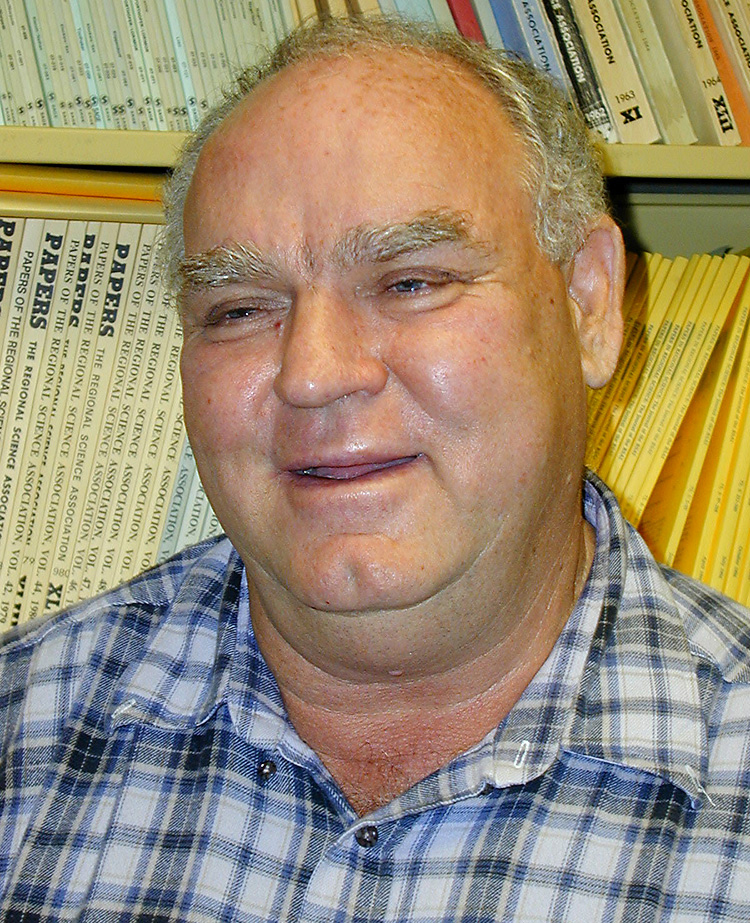
The faculty of UC Santa Barbara has bestowed its highest honor on Reginald Golledge, a professor of geography at UCSB and director of the campus's Research Unit on Spatial Cognition and Choice. Golledge, an internationally recognized scholar, has been named Faculty Research Lecturer for 2009.
In announcing the award, the UCSB Academic Senate noted that Golledge "has made extraordinary contributions to science, and created at least three distinct subfields of geography." The senate also credited Golledge with leading the Department of Geography to its current position as one of the top programs in the country, and called him "one of the world's leading forces for interdisciplinary research within this field and within academia in general." A behavioral geographer, Golledge is particularly interested in spatial cognition, cognitive mapping, spatial knowledge acquisition, spatial abilities, and spatial decision-making and choice behavior.
The Faculty Research Lectureship was established in 1955, and Golledge is the 54th recipient of the honor. His Faculty Research Lecture, which will take place on campus, will be free and open to the public. The date has not yet been determined.
Last year's recipient of the prestigious honor was David Awschalom, professor of physics and director of UCSB's Center for Spintronics and Quantum Computation. Awschalom is also acting director of the California NanoSystems Institute, a collaborative endeavor between UCSB and UCLA.
"The highest honor a faculty member can receive on campus is to be selected by one's academic peers to give the Annual Faculty Research Lecture," Golledge said. "I was surprised and excited to be selected for the 2009 award and readily admit that, as a disabled person, much of the credit for my career at UCSB must go to a supportive administration, a number of sympathetic and challenging collaborators –– foremost of which has been psychologist Dr. Jack Loomis –– and excellent graduate student research assistants."
Golledge, who lost his eyesight in the early 1980's, is a pioneer in the field of behavioral geography and, more recently, the field of disabilities geography. Using this background, he and his colleagues developed the UCSB Personal Guidance System, an innovative mobility system that combines spatial cognition, the science of geographic information systems, and support for people with physical limitations, including impaired vision. The success of this project has led to the launch of similar efforts around the world.
"Professor Golledge has continuously been at the forefront of innovative research in spatial analysis and in behavioral and cognitive therapy," Michael Goodchild, professor of geography and a member of the Academic Senate Committee on Faculty Research Lectureship, said in presenting the award to Golledge. "He established the intellectual foundations of these fields and proceeded to make a series of significant empirical contributions covering a broad range of contexts –– human way finding, migration, transportation, decision-making, and planning." He noted that Golledge's research has been driven by concerns for the quality of education not only at the collegiate level, but also at the elementary and secondary school level.
Golledge has received numerous awards and honors over the course of his career, including an honorary Ph.D. from Göteborg University in Sweden, and an honorary law degree from Simon Fraser University in Canada. In addition, he has been named a Fellow of the American Academy of Arts and Science and the American Association for the Advancement of Science. Other accolades include the Institute of Australian Geographers Gold Medal, the University Consortium of Geographic Information Sciences Researcher of the Year Award, the Grosvenor Medal for Geographic Education, the Lifetime Achievement Award from the American Association of Geographers, and the UCSB Outstanding Graduate Mentor Award.
Related Links



